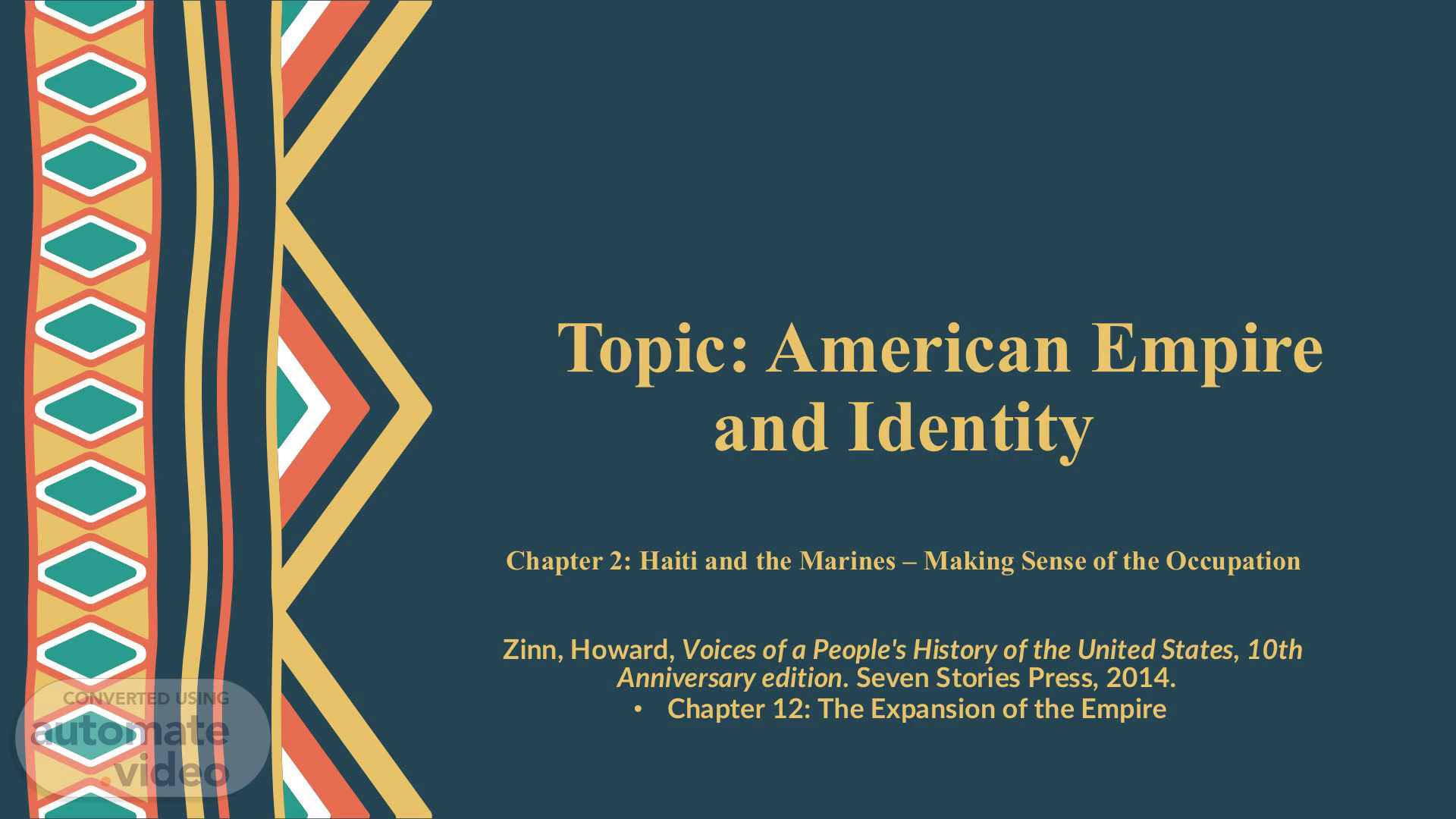Scene 1 (0s)
[Audio] Topic: American Empire and Identity Chapter 2: Haiti and the Marines – Making Sense of the Occupation Zinn, Howard, Voices of a People's History of the United States, 10th Anniversary edition. Seven Stories Press, 2014. Chapter 12: The Expansion of the Empire.
Scene 2 (24s)
[Audio] Chapter 2: Haiti and the Marines – Making Sense of the Occupation.
Scene 3 (31s)
[Audio] Overview In this chapter of Haiti and the Marines, the author details the lives of the marines who had landed in Haiti in the year of 1915 to what they refer to as carrying out the will of the government (Helping the Haitians) and the Haitian land on which they inhabited..
Scene 4 (48s)
[Audio] Chapter summary The Marines Cultural Baggage Their training, previous tours of duty and their camaraderie Beliefs shaped by racial hierarchies Military traditions.
Scene 5 (1m 0s)
[Audio] Marines core Beliefs Haiti was a strange and dangerous land They believed they were following orders to help Hati The united states rules were seen as necessary to bring order and progress Manhood should be proven through violence and domination.
Scene 6 (1m 16s)
[Audio] Haitian Beliefs Independence was seen as sacred from since the revolution of 1804 Vodou and Catholicism sustained identity and resistance They believed that black freedom is tied to national identity.
Scene 7 (1m 32s)
[Audio] The everyday life in occupation Violence became an everyday routine ( forced labor/ execution) The marines mocked the Haitians by the use of jokes, songs etc Haitians resisted to work daily and formed local rebellions.
Scene 8 (1m 47s)
[Audio] Overall naration Haiti and the Marines examines how U.S. Marines justified their role in the American occupation of Haiti. The Marines often described Haitians in racist and paternalistic terms, portraying them as primitive, lazy, and even childlike. By the use of these terms, the Marines tried to make it seem like they came to Haiti to uplift and discipline the nation rather than dominate, which is very ironic because violence was the center of the U.S. Marines' work. The paternalistic metaphor of the United States as the father and Haiti as the dependent child softened the reality of what was really taking place between the Haitians and the American Marines. The Marines violently suppressed the resistance movement, with the cacos rebels being one of them. This movement was seen as "discipline". Overall, chapter 2 of Haiti and the marines: making sense of the occupation showed or gives the narrative that domination is natural and necessary in the point of view of the Americans..
Scene 9 (2m 48s)
[Audio] Themes: ❖ Race and Perception- the marines' racism and stereotypes toward Haitians shaped the way in which they were treated. ❖ Violence and control- Violence was used as a tool to take control of the Haitian community ❖ Paternalism- the Marines looked at Haitians as incapable of managing their own government.
Scene 10 (3m 10s)
[Audio] Zinn, Howard, Voices of a People's History of the United States, 10th Anniversary edition. Seven Stories Press, 2014. Chapter 12: The Expansion of the Empire.
Scene 11 (3m 26s)
[Audio] Overview Chapter 12 of The Voices of a People's History focuses on the late 19th and early 20th centuries. During that time, the United States was expanding itself beyond its borders into places like Puerto Rico, Cuba, the Philippines, and Hawaii..
Scene 12 (3m 45s)
[Audio] Chapter Summary U.S imperial expansion ❖ The American war against the Spanish gave the United States control of Cuba, Puerto Rico, Guam, The Philippines and Hawaii ❖ The war was the starting point of the United States overseas Empire ❖ Filipinos expected independence after Spain's defeat but the American's refused to leave.
Scene 13 (4m 10s)
[Audio] U.S imperial expansion ❖ Expansion was driven by the search for raw materials and military bases ❖ The expansion provoked resistance.
Scene 14 (4m 21s)
[Audio] Themes War- It exposes the contradictions of American democracy. The war between the Spanish in 1898 was presented as a war to liberate Cuba, but instead it was used to gain control over Cuba. Resistance- Within the United States the anti-imperialist league argued that the government is not a democracy because they denied freedom to the colonized people. Connections to Domestic Struggles- The United States wated to control colonized populations overseas just as they did to the "poor" within their own country..
Scene 15 (4m 55s)
[Audio] How do the chapters link to each other ? My thoughts. The United States seems to have a pattern to wanting to control nations under the disguise of liberation. They often referred to the colonized people as "uncivilized" to justify their actions. They used violence as a form of discipline, inthe Philippines, the U.S. troops committed massacres and still insisted that the war was about freedom and in Haiti, the marines violently suppressed the acos rebels to enforce control. Looking at the two chapters togther you can definitely see the similarities..
